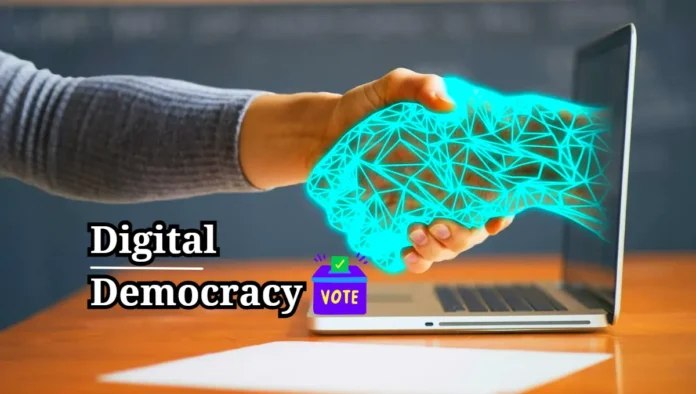Digital democracy: Social media and political participation
Outline:
1. Introduction
- Definition of digital democracy and its significance
- Social media and its impact on political participation
- Thesis statement
2. The role of social media in digital democracy
- The power of social media in shaping public opinion
- Social media as a platform for political discourse
- The use of social media in mobilizing political movements
3. The benefits of digital democracy
- Increased transparency in government
- Enhanced civic engagement and participation
- The potential for more diverse voices to be heard
4. The drawbacks of digital democracy
- The risk of misinformation and disinformation
- The potential for polarization and echo chambers
- The impact of algorithms on shaping public opinion
5. Conclusion
Introduction
Digital democracy refers to the use of technology to enhance democratic processes and participation. The rise of social media has revolutionized political participation by providing a platform for citizens to engage with their government and each other.
Thesis Statement:
Digital democracy has revolutionized political participation, with social media playing a pivotal role in shaping public opinion and mobilizing political movements.
While digital democracy offers many benefits, including increased transparency and civic engagement, there are also drawbacks such as the risk of misinformation and polarization.
The role of social media in digital democracy
Social media has transformed the way we communicate and interact with each other, including in the political arena. Social media platforms such as Twitter and Facebook have emerged as powerful tools for shaping public opinion, facilitating political discourse, and mobilizing political movements.
The Arab Spring is a notable example of how social media played a pivotal role in mobilizing mass protests and bringing about political change in the Middle East.
Social media has also been instrumental in breaking down traditional barriers to political participation. It provides a space for citizens to engage with their government, express their views, and participate in policy discussions. This has led to increased transparency and accountability in government, as politicians are now more accountable to the public than ever before.
The benefits of digital democracy
Digital democracy offers numerous benefits, including increased transparency in government, enhanced civic engagement and participation, and the potential for more diverse voices to be heard. By providing citizens with a platform to voice their opinions, social media has empowered previously marginalized groups, such as youth and minorities, to participate in political discourse and influence decision-making.
Furthermore, digital democracy has the potential to break down traditional power structures and provide opportunities for more direct democracy. The use of online voting systems and citizen initiatives have the potential to enhance citizen participation in decision-making and reduce the influence of special interest groups.
The drawbacks of digital democracy
Despite its benefits, digital democracy also has its drawbacks. The rise of fake news and the spread of misinformation on social media platforms pose a significant threat to the integrity of democratic processes. Algorithms that tailor content to users’ interests can also create echo chambers, reinforcing existing biases and polarizing public opinion.
Furthermore, social media has been criticized for being an inadequate substitute for traditional forms of political participation, such as voting and attending public meetings. The lack of face-to-face interaction can make it difficult to build consensus and foster meaningful dialogue.
Conclusion
Digital democracy has revolutionized political participation, with social media playing a pivotal role in shaping public opinion and mobilizing political movements. While digital democracy offers many benefits, including increased transparency and civic engagement, there are also drawbacks such as the risk of misinformation and polarization. As we continue to navigate the complexities of digital democracy, it is important to reflect on its potential and limitations and strive to maximize its benefits while mitigating its drawbacks.
